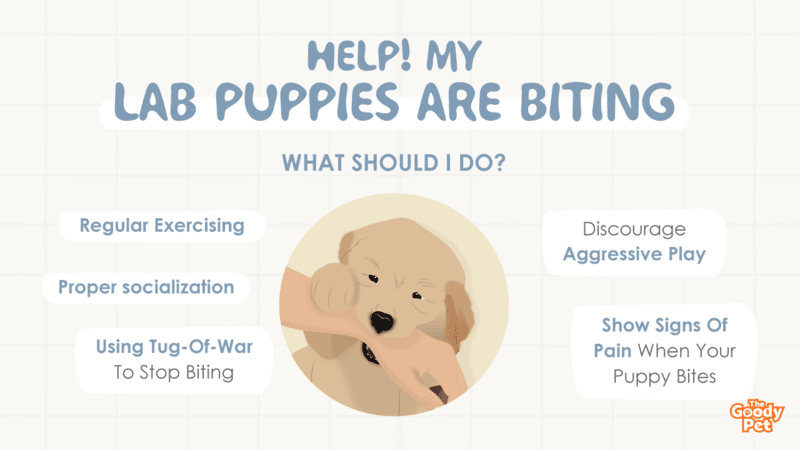Labradors have a reputation for being one of the friendliest dog breeds out there, which is why it comes as a surprise to most Lab owners when their pup starts biting and nipping.
Now, why do Lab puppies bite? A Labrador puppy may bite as a way of seeking its owner’s attention, to show excitement, or due to boredom. Similarly, a lab puppy may bite and chew due to a high prey drive present in the breed or in a bid to relieve pain in its mouth.
Now that we’ve established various reasons for biting in Lab puppies, it’s only right that we proffer solutions to the problem, why you should nip this act of biting in the bud, as well as what you can expect when training your Labrador. And without wasting much time, let’s jump right into the steps you can take to curb your Lab puppy’s biting.
How Do You Train A Lab Puppy Not To Bite?
Some of the most common and effective methods with which you can stop your Lab puppy from being aggressive and biting include:
- Regular exercising
- Proper socialization
- Discourage aggressive play
- Use of games like Tug-of-War
- Showing signs of pain when your puppy bites
Regular Exercising
The first, and arguably, one of the best ways of training your 10-week-old Lab Puppy to stop biting is by regularly engaging the pooch in quality exercises.
By quality exercise, we’re talking about structured games of fetch and the likes, that provide an effective outlet for your lab to get rid of excess energy without being necessarily aggressive. And this will go a long way in providing the required mental stimulation for your Lab puppy and greatly reduce biting due to boredom.
It is also important that you avoid over-exercising your Lab puppies. And to this effect, the recommended ratio for the amount of exercise needed by a Lab puppy is five minutes per month of age.
Proper Socialization
Labradors are quite friendly by nature, and socializing your pooch from an early age can be quite effective at preventing the development of undesirable behaviors such as biting.
Introducing your Lab puppy to other humans and dogs helps them become more comfortable around unfamiliar faces and surroundings and reduces aggression-based biting.
Discourage Aggressive Play
Rough or aggressive play tends to get lab puppies over-excited, and your pup may bite in its state of excitement; To prevent this from happening, reduce the frequency of rough play with your Lab, and be careful about who you let interact with your pup.
Additionally, when you notice that your Lab puppy is getting over-excited while playing, you should give your pup room to calm down by breaking off play for a while; this, you can do with a simple recall command. And once you notice that your Lab has regained self-control, you can release it to continue playing.
Using Tug-Of-War To Stop Biting
By initiating a game of tug-of-war anytime your Lab puppy starts biting, you can train your pooch to stop biting.
Once you notice your Lab nipping on that piece of furniture or biting you, show your disapproval with a ‘NO’, and immediately replace your arm or the furniture with the tug toy. It is also important that you praise your dog once it releases your hand and engages the tug toy.
Show Signs Of Pain When Your Puppy Bites
Once your Lab puts your hand in its mouth in an attempt to bite, let out a loud yelp while maintaining eye contact with the pooch, and then proceed to ignore such a pooch for the next 30 seconds, at least.
After 30 seconds, come back to your Lab puppy and resume play. And if the pooch makes an attempt to bite again, repeat the steps detailed above.
The goal of this exercise is to teach your pooch that fun stops once it starts biting, and resumes only when it stops biting. And it’ll help to repeat this exercise till your pooch gets the hang of it.
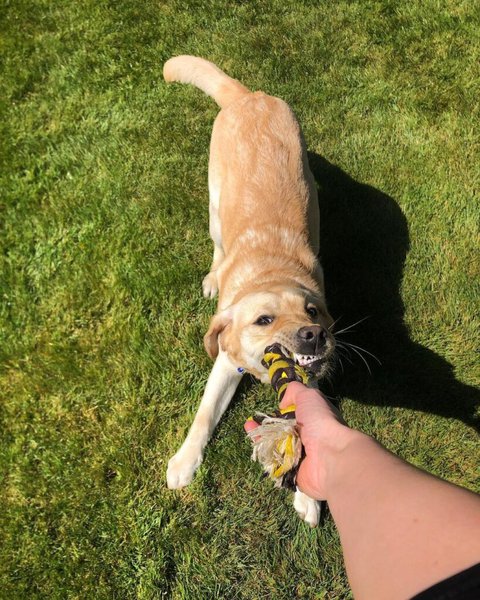
Why Does My Lab Puppy Bite Me So Much?
Lab puppies bite for several reasons, but they primarily do it as a means of communication. That said, below are a number of possible reasons why your lab puppy may bite you so much:
Attention-Seeking Behavior
A Labrador puppy may bite its owner as a way of seeking attention. This tendency to bite is commonly seen in puppies that don’t receive adequate attention from their owners. And the Lab puppy is further encouraged to bite if its owner has paid the slightest bit of attention – even in a negative manner – to such behavior in the past.
Teething
Lab puppies generally begin to grow teeth as early as eight weeks old. And this teething phase can last for up to six or seven months in some Lab pooches.
That said, the teething process can be quite painful for a pooch, and your lab puppy may bite and chew on objects a lot as a way of relieving the pain in its gums.
Sign Of Excitement
Lab puppies are easily excitable, and a pooch that hasn’t been properly trained on how to channel its emotions may bite out of excitement.
Inadequate Exercise
Lab puppies are quite active by nature, and they require constant exercising and mental stimulation to keep them entertained and to prevent the development of unwanted characteristics.
That said, a lab puppy that isn’t getting enough exercise may turn to biting and nipping, in a bid to let out some of its excess energy and to express frustration at not getting enough action.
Natural Behavior
The lab puppy is a hunter by design, and biting and chewing may just be a way for the pooch to act out on its naturally high prey drive.
Additionally, Labradors have a high tendency to hold and carry things in their mouths. And it is this desire to explore the world with their mouths that leads to higher occurrences of biting in Lab puppies.
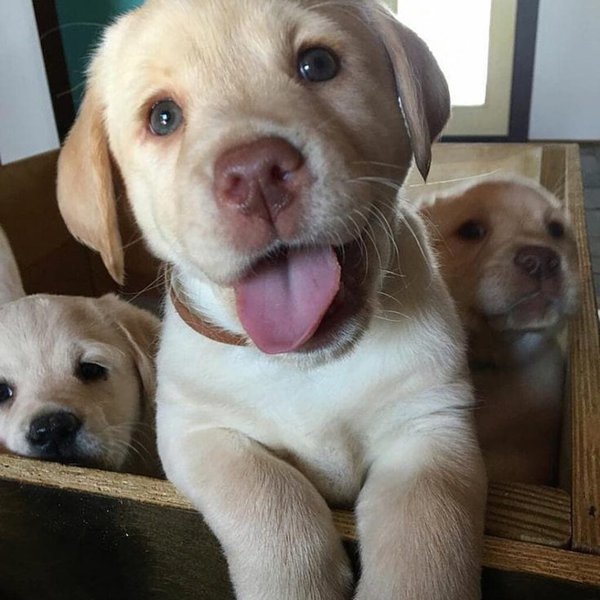
At What Age Do Lab Puppies Stop Biting?
Because biting is something that is ingrained in your Lab puppy’s DNA, the bad news is that it may take a while for your furry friend to stop biting.
Labradors, unlike most other dogs, tend to mature later, and it may take anywhere from 2 to 4 years for your pooch to attain maturity and stop biting.
However, using any of the training methods earlier discussed in the article, you can significantly speed up your pooch’s development, and get it to stop biting earlier.
Early Socialization
Not only is it important to train your Lab puppy to shape its behavior, but it is also equally crucial that you start the training as early as possible to make it easier for both you and your furry friend.
Waiting till your Labrador puppy attains full maturity before making moves to curb its biting will be quite difficult and may be impossible to achieve.
Positive Reinforcement
One way by which you can get your Lab puppy to stop biting earlier than expected is by the use of positive reinforcement, along with basic doggie commands that you must have taught to your pooch.
Lab puppies are quite eager to please their favorite humans, and by showering your pup with praise or offering it tasty treats anytime you successfully get it to stop biting on command, you’re reinforcing the pup’s belief that it’s doing the right thing.
And over time, your lab puppy will come to associate its non-biting as something that makes you happy, and gradually stop the act.
Cut Down On The Physical Play
As tough as this may sound, occasionally refusing to play and rejecting interaction with your Lab puppy may help curb its tendency to bite earlier. And the results of this method, which reflects a natural decrease in your Lab’s biting, will likely start to become visible as early as when your pup is five months old.
This, however, doesn’t mean you should neglect your puppy, and you must make sure to give it the required affection and a sufficient level of training to keep it mentally stimulated.
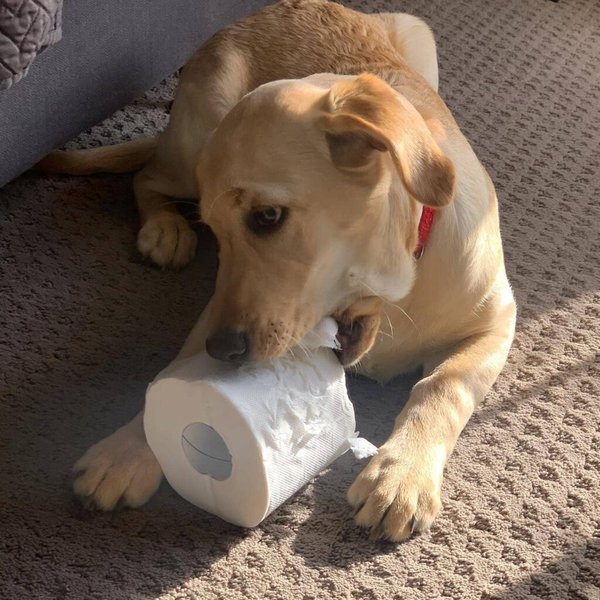
Are Lab Puppies Hard To Train? Temperaments Of Labrador Puppies
Lab puppies are typically easy to train, and this is, in no small part, due to their high level of intelligence and eagerness to please. Additionally, Lab puppies are incredibly motivated by food, and with the promise of a treat or two, you can easily get your Lab to train without stress.
Temperaments Of Lab Puppies
As stated in the introductory paragraph, Labradors are one of, if not, the friendliest dog breeds out there, and this has played a major role in the pooch’s popularity in the United States, and around the world in general.
Additionally, the Labrador is known for its great work ethic, and general alertness, which makes it suitable to be trained to function in a variety of roles. Also, with a history as a working dog, and originally bred to retrieve prey, the Lab puppy will be more than happy to take commands from you.
Are Lab Puppies Aggressive?
Studies have shown that Labradors are among the least aggressive dog breeds towards humans and other dog breeds. The Labrador is also renowned for its laid-back and patient personality, which is why it is quite popular among families.
However, like all other pooches, Labradors are capable of showing aggression, particularly if triggered by one or more factors. However, bear in mind that the Lab isn’t naturally wired to show aggression, and it will rather roll over for a belly rub or lick.
That said, factors that can cause aggression in Lab puppies include:
- Stress
- Fear and anxiety
- Frustration
- An underlying medical condition
Additionally, a Lab puppy that hasn’t been properly socialized or undergone the needed training may display signs of aggression.
The good news is that Lab puppy aggression can be cured. But to do this, you first need to identify the underlying cause before proceeding to administer the appropriate form of treatment.
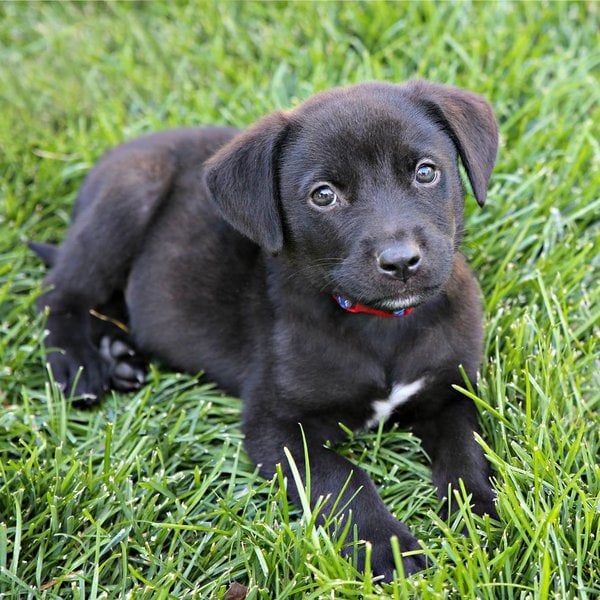
Related Questions
How Do I Get My Puppy To Lick Instead Of Biting? You can get your puppy to lick instead of biting by employing various training methods coupled with the use of positive reinforcement to encourage appropriate behavior. Even better, with adequate exercising and by teaching your pooch simple doggie commands, you can get your pup to stop biting completely.
Why Does My Puppy Bite Me When I Pet Him? Your puppy may bite you when you try to pet it simply because such a pooch is used to playing with its mouth or as a sign of affection. In the same vein, your puppy may try to bite you when you pet it because it is either scared or going through a painful teething process.
What Are The Best Teething Toys For Puppies? Some of the best chew toys to help your puppy relieve teething pains include toys like teething rings and freezable bones. And one product we’ll recommend you get for your teething puppy is the Chew King Fetch Balls; This durable rubber ball provides an effective and rugged outlet for your pup’s gnawing and chomping while teething.

